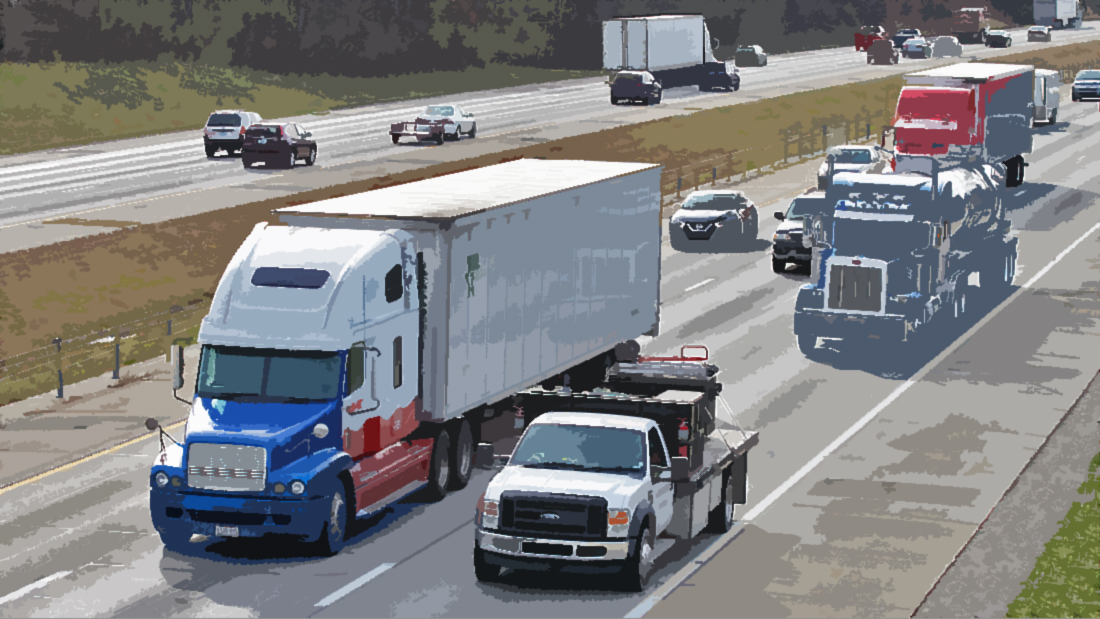
Truck Tonnage Declines in 2020, Through August
SCP’s The Economic Growth Monitor
Truck tonnage declines in 2020 included the fifth consecutive year-over-year decline in the U.S., through August 2020. Freight transportation is a barometer of U.S. economic health, making monthly truck tonnage estimates a key indicator for local economic development officials.
Trucking represents an estimated 72.5% of tonnage carried by all modes. According to American Trucking Associations, in 2019 trucks hauled 11.84 billion tons of freight. The American Trucking Associations is the largest national trade association for the trucking industry.
Transport Topics reports on truck tonnage throughout the year. Their most recent recap is available here: Tonnage Declines 8.9% Year-Over-Year in August
The American Trucking Associations’ press release about truck tonnage declines in 2020 is available here: Index 8.9% below August 2019. According to the ATA, the apparent softness in truck tonnage was due to softness in the industrial and energy industries where truck loads are heavier, than any softness in consumer-related loads. Fleets hauling for retailers reported strong freight volumes. ATA calculates U.S. tonnage volumes and index based on surveys from its membership and has been doing so since the 1970’s.
Edge Computing is Coming to You Soon!
SCP’s Economic Growth Monitor
Edge computing is coming to you, an essential part of our world of data centers, Internet cloud and the Internet of things. Since many local economic development professionals are interested in attracting major data center facilities, it is helpful to understand how these edge processing objectives may impact data centers and the rest of the connected data network.
In essence, edge computing is about distributed computing, delivering processing “horsepower” in low-latency situations as close as possible to where it is required. Also, enterprise datasets are getting huge and there is also a desire to reduce data transport costs. As a result, keeping more of collected data closer to its source simply makes economic and performance sense.
According to some industry sources, by 2025, 75% of generated data will be processed outside centralized data centers or the cloud.
Edge computing often involves data storage and processing with “edge devices.” A simple example of an edge device is a router that connects public networks to the internet. Or, in a finance setting, a smartphone or tablet becomes the edge device. Edge devices become increasingly specific to particular edge requirements. In healthcare, edge devices are increasingly deployed as wearable and/or implantable medical devices to support patient care.
Because this computer processing “at the edge” is implied as connected to data networks in the Cloud and in data centers, each edge device carries an implicit security risk. While the interest in processing power at the edge increases, getting the overall system security design in place is a large open issue.
There are benefits to edge computing in most every industry today. Network World joined with CIO, Computerworld, CSO, and InfoWorld, have prepared articles to explore “the edge” from five different perspectives, available here: Edge computing: The next generation of innovation
Dubai Announces Innovative Retirement Program for those Over 55 Years Old
SCP’s The Growth Monitor
Dubai is known for its innovative economic development programs, and with its announced retirement program it has again matched its reputation. Retiring in Dubai can be an attractive proposition for many given the city’s open-door policy, tolerance, and quality of life. This particularly economic development strategy successfully leverages existing regional assets with a new target market (retirees).
“Retire in Dubai,” the first of its kind in the GCC region, is being spearheaded by Dubai Tourism in collaboration with the General Directorate of Residency and Foreigners Affairs (GDRFA-Dubai). Dubai’s program is focused upon resident expatriates and foreigners over the age of 55 who are seeking to retire. Eligible applicants will be provided a retirement visa, renewable every five years, provided they can meet one of three financial requirements for eligibility. The eligibility can be based on either a minimum monthly income, savings, or the value of the Dubai owned property.
More details about the program were detailed in an Arabian Business article of September 3, 2020: Dubai launches retirement programme for over-55s.
Crystal Lagoons’ PAL Venues Take Over as Top MPC Amenity
AEC’s Consumer Products Monitor
Twenty+ years ago among the sought-after amenities for master-planned communities (“MPC”) was the 18-hole golf course, often enhanced with a top golf course architect. From past Urban Land Institute (“ULI”) research we know there is a premium for a home sold in an MPC setting as compared to the same home outside of an MPC. Golf courses, whether you played or not, were part of a developer’s calculation for the MPC’s value to home buyers. Along with master landscaping, design controls, security, parks, and other amenities.
Crystal Lagoons, the “water tech” company, may have displaced golf in this role, at a time when golf has diminished as an interesting sport among consumers, whether to play or watch. Crystal Lagoons has pioneered an innovative product for land-bound urban and exurban locations, which they’ve dubbed, Public Access Lagoons™. Over the past 20 years , the company has successfully introduced their tropical lagoon and beach destinations through more than 600 projects in 60 countries worldwide (these numbers are probably far higher now than when first released by the company). And the company is on a roll signing up new installations in the U.S. The company’s is distinct enough as an integrated technology and business solution that they offer their intellectual property to 3rd-parties in the form of Master PAL agreements of particular exclusive regions.
The Crystal Lagoons’ product website has some terrific images and video for review, for anyone that has not enjoyed their tropical environments.




